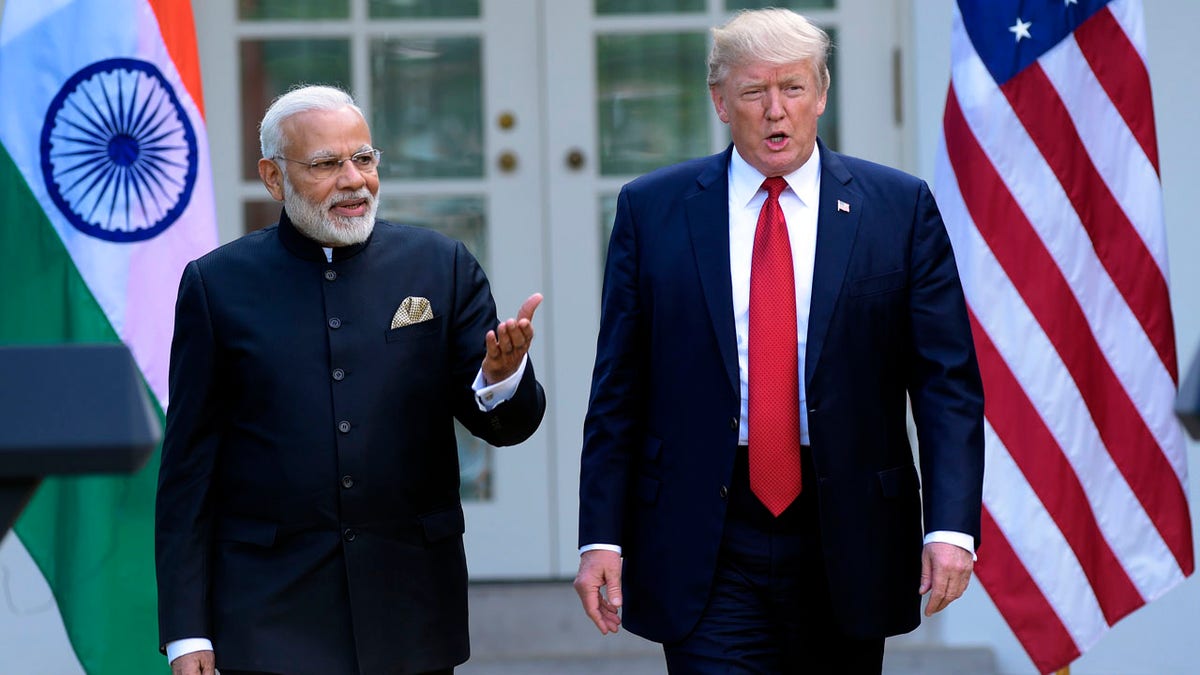
President Donald Trump and Indian Prime Minister Narendra Modi, step into the Rose Garden to make joint statements at the White House in Washington, Monday, June 26, 2017. (AP Photo/Susan Walsh) (Copyright 2017 The Associated Press. All rights reserved.)
President Donald Trump and Indian Prime Minister Narendra Modi vowed Monday to enhance the relationship between their two countries, with Trump vowing that “India and the United States will always be tied together in friendship and respect.”
“The future of our partnership has never looked brighter,” said Trump during a joint appearance with Modi in the White House Rose Garden. The president also thanked “the Indian people” for their efforts in Afghanistan and in levying new sanctions against North Korea, which the president said “has to be dealt with and probably dealt with rapidly.”
Trump also noted that both the U.S. and India have been affected by the "evils of terrorism" and the "radical ideology that drives them" before vowing to "destroy radical Islamic terrorism."
Working together, I truly believe our two countries can set an example for many other nations.
Trump also attempted to inject a note of levity by describing him and Modi, leaders of the world's two largest democracies, as “world leaders in social media.” The American president has approximately 32.8 million Twitter followers, while Modi – who also makes prolific use of the platform – has approximately 31 million followers.
“We’re believers [in] giving the citizens of our country the opportunity to hear directly from their elected officials and for us to hear directly from them,” Trump said. “I guess it’s worked very well in both cases.”
At the end of his remarks, Modi invited Trump and his family to visit India. The two men embraced as they concluded their remarks.
Earlier, Trump heaped praise on Modi during Oval Office remarks as a "great prime minister" who had brought economic growth to India. Modi recalled Trump's visits to India long before he was president and said he was looking forward to collaborating with him now that he is president.
"The relationship between the United States and India is very, very strong and very, very powerful," Trump said. "We agree on most things. And I would say, by the end of the day we'll agree on everything. I have a feeling," he joked.
Hours before Modi's arrival, the State Department imposed sanctions on Syed Salahuddin, the Pakistan-based leader of Hizbul Mujahideen, the main rebel group that fights against Indian control in the divided Himalayan region of Kashmir. India's foreign ministry hailed the move.
The Trump administration says it wants to provide India the kind of defense technology it does to the closest U.S. allies. In a concrete indication of that, the U.S. State Department approved the $365 million sale of a C-17 military transport aircraft. The administration is also set to offer a $2 billion sale of U.S.-made unarmed drones to help in surveillance of the Indian Ocean.
Trump thanked Modi for India's purchase of U.S. military equipment. Since 2008, India has signed more than $15 billion in U.S. defense contracts.
Later Monday, Modi was scheduled to have dinner with the president and first lady -- the first dinner Trump has hosted for a foreign dignitary at the White House, although he has hosted the leaders of Japan and China at his resort in Florida.
Before going to the White House, Modi met separately with Secretary of State Rex Tillerson and Defense Secretary Jim Mattis.
Trump and Modi share a populist streak and a knack for social media, but their economic nationalist agendas could clash. While Trump champions the idea of "America First" and wants to stop the migration of jobs overseas, Modi has his own drive to boost manufacturing at home, dubbed "Make in India."
India is among the nations singled out by the Trump administration for their trade surpluses with the U.S., and it is also reviewing a visa program used heavily by skilled Indian workers.
The Associated Press contributed to this report.




